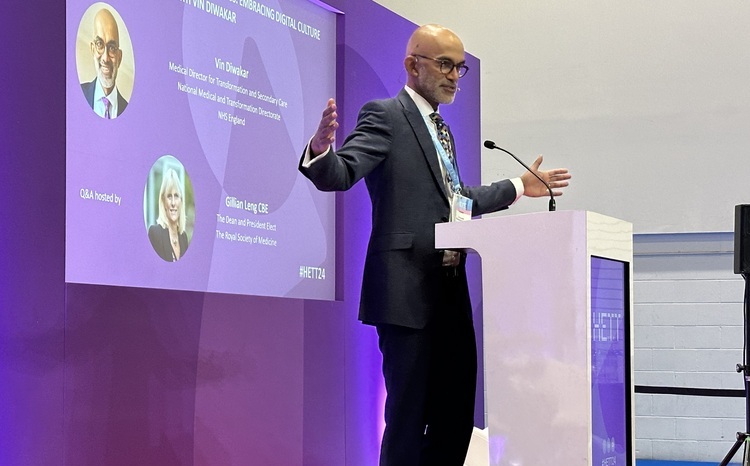NHS shouldn’t use tech risks fear to avoid embracing innovation – Ferris
- 15 March 2023

The health service needs to ensure that fear of the risks of technological innovation don’t slow the pace of change, national director of transformation at NHS England Dr Tim Ferris told a keynote session on the second day of Digital Health’s Rewired conference.
Ferris told a capacity crowd that risk of change is the “elephant in the room.”
He said: “Lots of really clever people can fill hours and hours listing the risks that might occur with this change, and I have never heard anyone say, ‘what is the risk of not changing?
“But the risk of not changing for the NHS is significant. I would like to see more people who are talking about change reminding (others) about the counterfactual, and the counterfactual is that the status quo is not serving us well.”
Capacity problems exacerbated by an ageing population means the NHS will be unable to provide the same level of care in the future without the use of AI and other technologies that can save time for clinicians and administrators, he added.
Investing in prevention and population health solutions is a vital part of this process and can significantly reduce health disparities, he said.
To take one example, he said the NHS is currently delivering 60% of the secondary prevention to those with known cardiovascular diseases; extending this to 80% would lead to 8,500 fewer heart attacks and 12,700 fewer strokes annually as well as saving more than £200 million annually for the health service.
Ferris also explained that digital innovation is already helping to make communication easier within the health and care system, with “half of social care providers digitised today, compared to 40% a year ago.”
The development of integrated care systems (ICSs) has the potential to simplify interoperability and increase the ability of health and social care staff to get access to the health information they need wherever they are, he added.
Manchester University Hospital NHS Trust introduced an EPR that has replaced more than 700 systems with just one, Ferris said. The NHS app is further transforming the way people interact with the health system.
Making workflows easier
Ferris, who was appointed NHS director of transformation back in March 2021, believes transforming health pathways should be a central focus of digital technology in the NHS.
He said: “The largest potential increase in productivity in the NHS is through the use of AI to reduce the documentation burden. We have to aspire to these types of step changes in productivity because what is Plan B?”
Ferris also said infrastructure, or “commodity” spending, where national government spending can provide leverage, needs to be treated differently from the state-of-the art technology that is often piloted at the Trust level.
He said: “The vast majority of technology spend in England is not spent centrally but is spent in trust budgets and that’s where most of the innovation is taking place.”
In the second half of the keynote session, executive director of Graphnet Health, Markus Bolton, emphasised the importance of ensuring that NHS systems work across health and social care with a focus on communities, rather than prioritising the development of EPRs that work in hospital silos.




